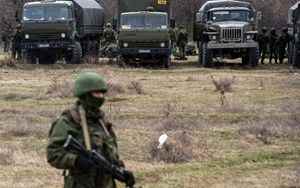(Finance) – The situation in the Donbass is increasingly tense. Today – according to local media – acar bomb exploded in a parking lot next to a government building in the center of city of Donetsk, controlled by pro-Russian separatists in southeastern Ukraine. The leader of the self-proclaimed Donetsk People’s Republic, Denis Pushilin, announced today “a mass evacuation of civilians to Russia”, accusing the Ukrainian forces of having “bombed the settlements of the republic”. The leader of the Donetsk separists specified that civilians will be housed in the Russian region of Rostov, “as agreed with the Russian authorities”. The estimate is to evacuate around 700,000 people to Russia.
The announcement ofevacuation of civilians from separatist areas of eastern Ukraine to Russia it was defined by the US as a “cynical and cruel” move by Moscow. “These announcements – said a spokesperson for the US State Department – are a further attempt to hide, with lies and disinformation, that the aggressor in this conflict is Russia. It is also cynical and cruel to use these humans as pawns to distract the world from the fact that Russia is amassing her forces in preparation for an attack. “Although the Kremlin continues to speak of partial withdrawal, theUS ambassador to OSCE Michael Carpenter he estimated that Moscow has amassed up to 190,000 troops in and around Ukraine, including the breakaway republics. At present, however, there is no evidence that Ukraine, as Russia claims, is preparing an offensive in the region.
“The situation is deteriorating – commented the Russian leader Vladimir Putinconvinced that Westerners will find “an excuse” to impose sanctions on Moscow without responding to its demands on European security, which Berlin dismissed as “Cold War demands”.
Faced with escalation, Joe Biden rallied and summoned EU leaders on a conference call before speaking from the White House again. The aim is to make a common front with Europe using the threat of swift and severe sanctions in the event of an invasion. They will participate in tonight’s meeting Mario Draghi, Emmanuel Macron, Olaf Scholz, Boris Johnson, Justin Trudeau, the Polish Duda and the President of Romania Johannisin addition to NATO Secretary General Jens Stoltenberg and, for the EU, the President of the Commission Ursula von der Leyen and the Prime Minister Charles Michel.
On the front of the economic repercussions Draghi spoke today. “At the moment – said the premier – there is still no assessment of the quantitative impact of any sanctions, but it is known that certain sanctions would have more impact on Italy and less on other countries. And the answer is clear enough: all sanctions that indirectly impact the energy market impact more on the country that imports the most gas. And Italy has only gas, it does not have nuclear power and coal and is more exposed. We are also studying how Italy can continue to be supplied by other sources should those from Russia fail. “
Germany is also concerned about the impact of the sanctions. “Even if the gas supply will not be limited, – said the president of the Ifo Institute for Economic Research Clemens Fuest – there could still be a price shock, at least temporarily. This could affect both private homes and industries equally in Germany. We currently expect inflation of 4 percent by 2022. If war breaks out, it could be even higher. “As Fuest points out, Western Europe needs Russian oil and gas, while Russia is counting on revenues from these. exports. Fuest believes that Russia is unlikely to cut gas supplies, as it wants to continue selling gas to Europe in the future. Outside the energy market, the Russian economy is not that significant. Fuest points out that the country’s GDP is equivalent to the economic performance of Belgium and the Netherlands combined. Moreover, Russian economic relations are already limited by the sanctions currently in force. ” The sanctions imposed due to the occupation of Crimea – he says Lisandra Flach, director of the Ifo – they have reduced Germany’s economic performance by about 5 billion euros a year, equal to 0.16 per cent of GDP. For Russia, the damage resulting from sanctions is greater and equivalent to 1.2 percent of Russia’s economic return. If they were imposed, further sanctions would put a strain on the German economy, but even more so on the Russian economy “.
